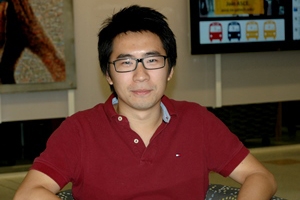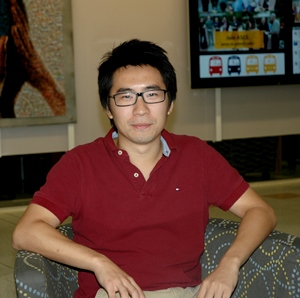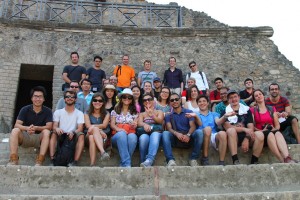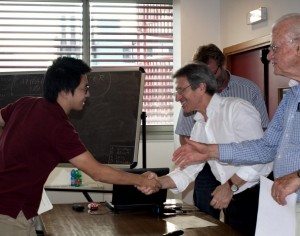
 A two-week intensive training at the world-renowned LARAM school this past September gave CEE doctoral student Fangzhou “Albert” Liu a boost in his earthquake analysis and damage mitigation research.
A two-week intensive training at the world-renowned LARAM school this past September gave CEE doctoral student Fangzhou “Albert” Liu a boost in his earthquake analysis and damage mitigation research.
The LAndslide Risk Assessment and Mitigation ("LARAM”) school is a two-week session that is held annually at the University of Salerno, Italy. Experts from several disciplines lead workshops on subjects ranging from landslide risk analysis and zoning to geomechanics and slope stability analysis of liquefiable soils.
Participation in the LARAM school is determined by a competitive process that chooses just 40 Ph.D. students worldwide for the annual seminar. Once chosen, the students are invited to attend for free.
“I was able to talk with people from different disciplines – geologists, geomorphologists, not just engineers – and it got me thinking about new ways to look at earthquakes and landslides,” said the China native, who earned his undergraduate degree in civil engineering at the University of Bristol.
“He is one of the most engaging and hard-working students in my research groups,” said Dr. David Frost, who has mentored Liu. “I was pleased that he was given this incredible opportunity to attend the LARAM school.”
 Liu, 26, is fascinated by the fluidic behavior of soil during seismic events. It is an area of geosystems engineering that piqued his interest before he arrived at Georgia Tech in 2011, when a professor asked him to analyze soil samples that were brought back from Haiti after the 2010 earthquake.
Liu, 26, is fascinated by the fluidic behavior of soil during seismic events. It is an area of geosystems engineering that piqued his interest before he arrived at Georgia Tech in 2011, when a professor asked him to analyze soil samples that were brought back from Haiti after the 2010 earthquake.
“It was a very simple geotechnical analysis of the soil composition, looking at their plasticity index [PI], said Liu. “It got me thinking. What would make the ground, which seems so solid, liquefy during an earthquake? The answer would have to be in the properties of the soil itself.”
At Georgia Tech, Liu has worked on both configuring and testing a new Pulse EKKO Pro Ground Penetrating Radar system that analyzes soil changes during seismic loading. He has also worked with remote sensing technology to get geo-spatial analyses of large-scale ground movements. Going  forward, his earthquake and landslide mitigation research will focus in part on the integrated use of information technologies and other laser-imaging systems to quantify both surface and subsurface large-scale movements.
forward, his earthquake and landslide mitigation research will focus in part on the integrated use of information technologies and other laser-imaging systems to quantify both surface and subsurface large-scale movements.
At LARAM, he was introduced to new numeric modeling and probability methods for landslides – an aspect of earthquakes that was relatively new to him. Of particular interest was Hong Kong’s early warning system which uses rainfall statistics and complex modeling to calculate the probability of a landslide.
“Hong Kong is very mountainous, so this is a very good system,” he said. “It’s like a universal playbook that takes into account different variables and predicts the volume of a landslide.”
Liu hopes to complete his doctorate at Georgia Tech by 2016.
